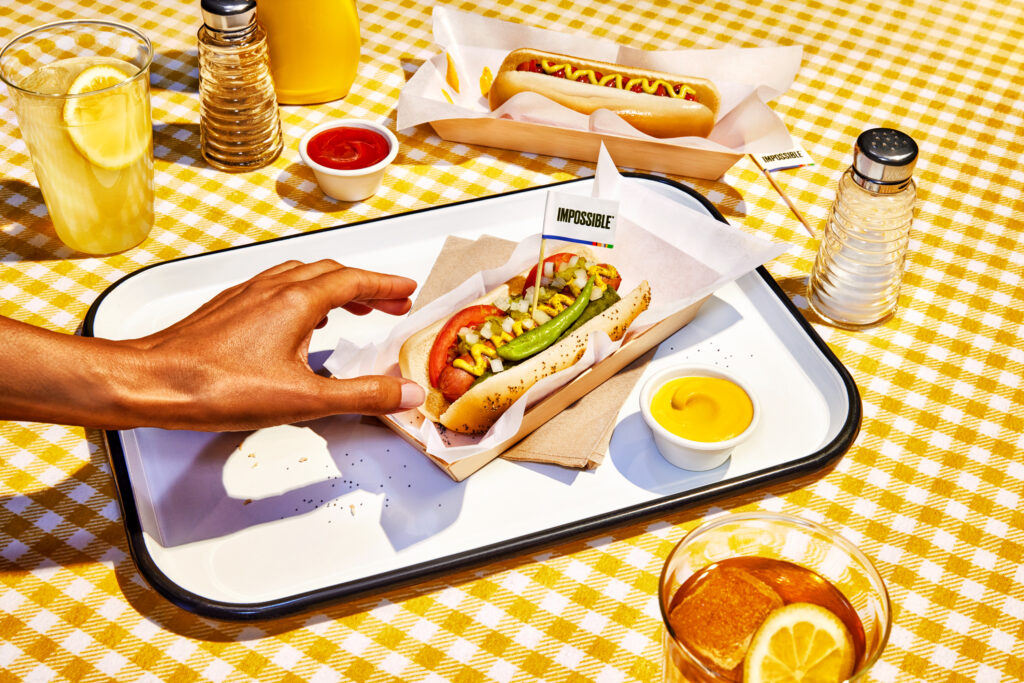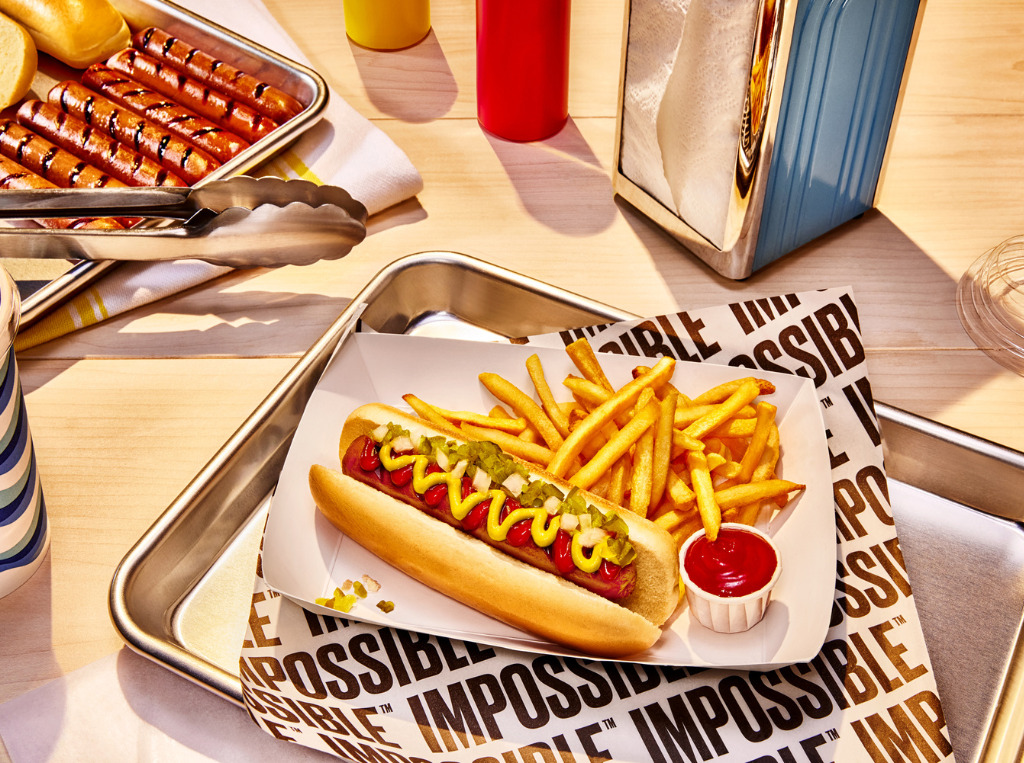7 Mins Read
Impossible Foods is launching a plant-based beef hot dog that will be available in both grocery stores and restaurants next year. The announcement follows a UK foodservice deal with world-renowned chef Gordon Ramsay.
During a busy year filled with sales growth, new ad campaigns and a host of product launches, as well as a patent battle and employee layoffs, Impossible Foods is capping off 2023 by debuting its first hot dog product. Next year, the Californian company will launch a vegan hot dog dubbed the Impossible™ Beef Hot Dog. Hot dogs are a classic American food, and the news signals the company’s intention to appeal to meat-eaters as new customers over vegans or vegetarians who already buy its products. The product will be sampled in New York City during a one-day pop-up event on December 16.
This year saw Impossible launch six new products. In February, it added tenders, spicy nuggets and spicy patties to its chicken analogue line, followed by Beef Lite, an alternative to 90/10 lean beef, a few weeks later in March. And in June, it debuted the opposite of the latter – a juicier, premiumised Indulgent Burger. The company also introduced an unbreaded chicken fillet exclusively for foodservice in LA this summer (with eateries like Monty’s Good Burger and Crossroads Kitchen), which is rolling out more widely now.
The product innovation isn’t stopping, with the Impossible Hot Dogs slated to be the company’s first launch in 2024, which will be available across retail and foodservice. Impossible already has a bratwurst SKU with a “vegetal casing” – launched last year as part of a sausage link range – but it has been described as having more of a breakfast-y flavour. The forthcoming hot dog will be the first product made to replicate the quintessential American food. Asked whether the hot dog will aim to target sports and event stadiums, the company did not comment.
Is a healthy hot dog impossible?

Impossible has stepped up its health focus in recent months, as part of a concerted effort by the plant-based industry to amplify the nutritional credentials of its products. This has seen fellow vegan giant Beyond Meat doubling down on the health aspect with new dedicated commercial campaigns and certifications from the American Heart Association (AHA).
Impossible too gained the AHA’s Heart Check certification for its Beef Lite product last month, becoming only the second plant-based meat company to do so. This health spotlight continues with its new hot dogs, which the company says contain 50% less total and saturated fat than “a leading animal-based hot dog served in restaurants”, 12g of protein (vs 6g), and, of course, zero cholesterol.
Beloved by Americans nationwide, hot dogs are the epitome of processed food. In fact, processed meats like these are categorised as a Class 1 carcinogen by the World Health Organization. With the health credentials dialled up, would consumers be deterred from an ultra-processed food (UPF) – like the Impossible Hot Dogs – that is aiming to replace another UPF?
After all, plant-based meats have been criticised for their often ‘overprocessed’ nature by proponents of the meat industry. It has been a point of contention and led to the meat lobby curating targeted ads about the long ingredient lists on plant-based analogues, which Impossible famously responded to with its own spoof commercial.
Speaking to AFN last month, Impossible CEO Peter McGuinness was asked about Beyond CEO Ethan Brown’s assertion that “the [negative] health perception of the category is the most immediate and important variable to address in order to restore growth”. He responded: “We’ve got to counter this chemical, fake, overprocessed [narrative]. There have been a lot of things said about plant-based and some of it sticks. The processed [narrative] has stuck with consumers and we’ve got to fix it and attack it head-on.”
A Food Marketing Institute study last year found that 50% of Americans believed plant-based meats were healthy in 2020, but that number dropped to 38% in 2022. And a 1,022-person survey earlier this year found that health is the major reason Americans eat vegan or vegetarian diets, with six in 10 choosing it. And in terms of plant-based meat products like Impossible’s, ‘healthy’ is the most appealing labelling description.
American attitudes towards UPFs

So consumers are searching for healthier foods in terms of meat alternatives and other plant proteins – can the Impossible Hot Dogs fit the bill? If recent research published in The Lancet (and sponsored by WHO) is anything to go by, plant-based meat may not be all bad. It revealed that while UPFs are associated with an increased risk of multimorbidity (the medical term for when someone has two life-threatening diseases concurrently) of cancer and metabolic diseases, this is associated mostly with animal-derived foods and artificially sweetened or sugary beverages.
The study noted that plant-based meat, however, was not associated with the risk – thanks to the high fibre content and lower amount of saturated fat, sugar and calories than conventional meat. And a survey of 2,000 Americans in October found that 82% of consumers eat UPFs, and 43% don’t believe they’re bad for health.
Plus, nearly two-thirds (65%) would be open to incorporating UPFs in their diets if additional health or nutritional benefits were listed on-pack – this rises to 85% for parents with children under 18. And 67% of respondents would be willing to pay more for UPFs with more nutritious ingredients that delivered better health benefits, irrespective of their household income. Younger adults aged 18-34 are nearly twice as likely to pay more for healthier UPFs (84%) than those aged 65 and over (43%) – this is reflected in research suggesting that more American Gen Zers want to go vegan for their health than the environment.
“Hot dogs are an undeniably classic part of American culture and not to mention, they’re a burger’s best friend. It’s long been a priority to add them to our product portfolio” said McGuinness. “Our adaptation replicates that quintessential hot dog taste while offering consumers a nutrient-dense product that’s better for the planet.”
Hot dogs are far from a “healthy” food. An Impossible spokesperson told Green Queen that the new product is a testament to “our focus on making products that appeal to actual meat eaters”. They said the company is looking to reach and appeal to meat-eaters, not vegans or vegetarians already eating more planet-friendly diets. “Our goal is not to compete with fruits, vegetables, and other whole foods, but to offer meat eaters products that are better for them and the planet.
Details under wraps, but new foodservice link-up coming soon

Details about the product’s ingredients and availability are sparse for now, and Impossible remained tight-lipped on them when pressed by Green Queen.
Asked how the company is faring financially – it laid off 20% of its workforce (132 employees) in February after a 6% cut last October – the company declined to share this information at this time.
McGuinness did tell AFN earlier this year that the company’s retail performance is strong: “In the 52-week Nielsen [data], we’re still growing high single-digit, low double-digit in retail, which is great. We have a 50% repeat [purchase rate]… so every two people we get to try our product, one repeats, which is quite strong.”
Speaking to Green Queen last month, a company spokesperson said: “Impossible is doing its part to introduce meat from plants that rivals the animal and as a result, we’re responsible for driving a majority of the category’s growth. However, we need to increase the availability of products that taste as good or better than their animal counterparts across the category. Doing so will increase the probability that a consumer will have a positive experience and turn a sceptic into a believer.”
Impossible says its new hot dogs are meant to be cooked the same way as conventional ones, and work well with condiments like mustard and ketchup or as a topping on chilli. “We want people to see that there’s really no compromise when you choose Impossible products. It’s as easy as throwing an Impossible Hot Dog on the grill – right next to an Impossible Burger,” outlined McGuinness.
The growing importance of health doesn’t mean its eco credentials are on the back burner. The company highlights that its vegan hot dogs – or as it likes to say, “made from plants” – cause 84% fewer greenhouse gas emissions, require 77% less water and use 83% less land than a beef-based counterpart.

The announcement comes just a few days after the company extended its commendable foodservice record with a partnership with Gordon Ramsay Restaurants in London, becoming the first alt-meat to be offered at the Michelin-starred chef’s Street Burger and Street Pizza chains. It’s not the first time they’ve collaborated though, with Bread Street Kitchen locations in Singapore adding the Impossible Burger to their menu in 2019.
This link-up adds to long-running foodservice collaborations with American chef David Chang (seven years), hamburger chain White Castle (five years), Burger King, Starbucks (four years each) and Disney (three years). Impossible also recently teamed up with Ruby Tuesday with its Indulgent Burger.
As it prepares to launch its hot dogs, the company’s main competitors include Field Roast, Tofurky, Lightlife, Upton’s Naturals and MorningStar Farms. Can Impossible’s health link make it stand out from the crowd?




